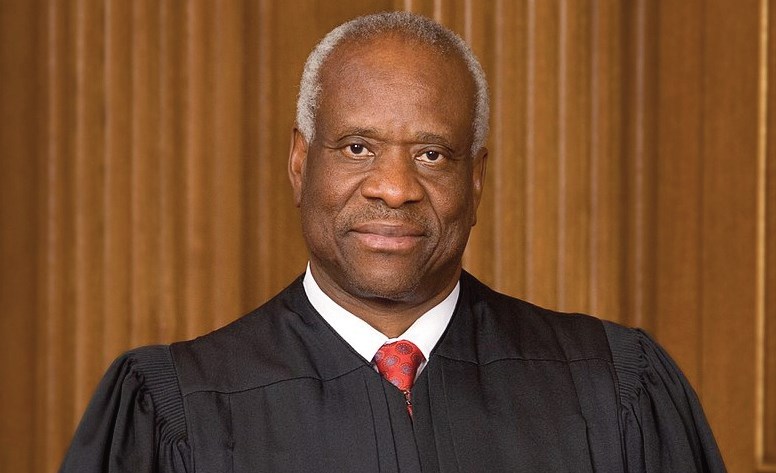U.S. Sup. Ct. Justice Clarence ThomasPHOTO COURTESY OF WIKIPEDIA
There have been important moments in history, American history, to which a generation’s collective consciousness can reach back and recall where they were, and how the event affected them.
Baby Boomers have significant markers that they can extract from the mid-20th century, such as the mutilated and waterlogged body of murdered teen Emmitt Till pictured in Ebony and Jet magazines; the March on Washington; the assassinations of President John F. Kennedy, his brother Robert F. Kennedy and the Rev. Dr. Martin Luther King, Jr.; the moon landing; and Watergate.
The generation that followed, Gen X, too, can agree that there have been key moments in late 20th century America that bind them together: the televised broadcast of the Challenger disaster, the Million Man March, OJ Simpson and the Bronco chase, the largest school shotting massacre at the time, Columbine, President Bill Clinton’s sex scandal, and of course the terrorist attack at the World Trade Center on Sept. 11, 2001.
Those are incidents that have had such a sudden profound impact on our psyches that it is difficult to erase the emotions and the reactions that were felt when these historical markers occurred, and the only way to process them, or attempt to make sense of them, is the knowledge that the experience is a shared one, and that acknowledgement, support and empathy can be expressed.
Baby Boomers, Gen Xers, Millennials and Gen Z are collectively living in a consequential moment in American history. It is this year, 2024, added to the last six years, that have made this a prequel to the earthquake and the aftershocks that will reverberate through Generations Alpha and Beta.
Unbeknownst to those who choose to remain distracted by social media sideshows and celebrity “beefs,” America’s democracy is being held hostage by one man, his millions of supporters, political allies, blind selfishness, and deep-seated hatred for the word “accountability.”
Last week, the United States Supreme Court heard oral arguments in the case of Donald J. Trump v. United States. Let’s be clear: The court, in theory, was created to be the nation’s highest legal institution; the last point of decision based on appeal from lower courts. Decisions by the Supreme Court can result in key legal statutes that reverberate not just for the plaintiffs of that case, but for the entire country.
Plessy v. Ferguson, Brown v. Board of Education, and Roe v. Wade are landmark decisions by the U.S. Supreme Court (SCOTUS) that have had a direct effect upon all Americans for subsequent generations. In theory, SCOTUS is supposed to chiefly operate on the premise that it is nonpartisan, the uninfluenced by the political party that selects its members.
Does SCOTUS have a history of being partisan or leaning into white supremacy? Yes. Plessy v. Ferguson decision in 1896 upheld and legitimized Jim Crow laws and segregation in the South with “equal but separate accommodations for the white and colored races,” until it was duly challenged by the Brown v. Board of Education case in 1954, and later in 1964 when President Lyndon Johnson signed the Civil Rights Act. It took only 68 years to void Plessy legally, and in 2024, believe it or not, the fight continues. Generational fight.
Today, SCOTUS is so completely and obviously partisan that it has become confident enough to parade its extreme conservatism in public. The reason is because SCOTUS fears no retribution and is accountable only to itself.
Six of the nine justices – John Roberts, Neil Gorsuch, Clarence Thomas, Sam Alito, Brett Kavanaugh and Amy Coney Barrett – sit as unmasked as DC Comics villains, the Legend of Doom and their leader, while former president Donald J. Trump is the dumbed down Lex Luthor.
The 91-times indicted former president is seeking absolute immunity from being criminally prosecuted for stealing, concealing, and lying about classified documents he kept at his residence, and all his not so clandestine activities after the 2020 election season. To do this, he needs the cooperation of the United States Supreme Court to make that happen.
During oral arguments last week, it was clear that certain court justices are willing to assist Trump in getting his way. There was the crazed hypothesis presented by Trump attorney John Sauer that a president should be exempt from criminal and civil prosecution under an “absolute immunity” clause. There were the conservative justices, with the slight exception of Amy Coney Barrett, suggesting a distinction between “personal gain” and “official acts” that could warrant varying degrees of immunity, in the most vivid example of how in the pocket of Trump SCOTUS has become.
If the court in any way grants the former president absolute or even partial immunity, it would mean that each case he is under indictment for, outside of the current election interference trial, would disappear. Vanish!
But as he pointed out himself on Truth Social, it would also change the scope of how future presidents perform in the Oval Office. The ramifications would be severe for generations. If former president Trump is granted absolute or partial immunity, nothing would stand in the way of future presidents using the position, as Justice Ketanji Brown Jackson, surmised to perpetuate crimes or possibly turn the Oval Office “into a crime center.”
The most essential note to take away is if SCOTUS gives Trump what he wants, the Constitution and our democracy would be shattered. Elected officials across the board could do what they please and receive immunity from prosecution. America would no longer be a democracy. It would be a dictatorship of authoritarianism. It goes without saying that SCOTUS’ decision could indeed reverberate for generations to come. Or maybe it should be said that this is the prequel to what is to come.













No Comment